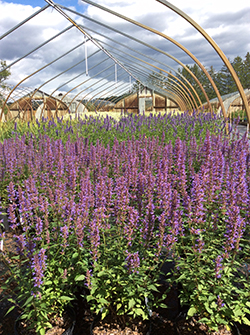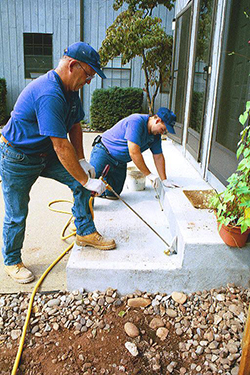The Federal Insecticide, Fungicide and Rodenticide Act of 1972 (FIFRA) required each state to set up a program to certify users of pesticides. New Jersey, through the New Jersey Department of Environmental Protection Pesticide Control Program began its certification program in 1975. Currently, certification and licensing is administered by the NJDEP Bureau of Licensing and Registrations. The NJDEP’s certification and licensing program is designed to facilitate, demonstrate, and maintain acceptable competency in the safe use of pesticides by certified pesticide applicators in New Jersey.
Licensed applicators of pesticides are classified as either private or commercial. The definition of each is as follows:

Private Applicator – Any person who uses, or supervises the use, of pesticides for the purpose of raising an agricultural commodity. The pesticide use can be on land owned or rented by the applicator or the applicator’s employer. Examples of private applicators are dairy farmers, vegetable or fruit growers, greenhouse growers, ranchers, nurserymen, and home gardeners.
Commercial Applicator – Any person who uses or supervises the use of any pesticide for any purpose or on any property, other than as provided by the definition of “private pesticide applicator.” Most people who apply pesticides as part of their job, or on a for-hire basis need to be licensed as a Commercial Pesticide Applicator. Any person who uses or supervises the use of pesticides on property other than their own (whether or not money is exchanged). Also, any person who applies pesticides as part of his or her job with any government agency.
 Examples of commercial applicators are those who apply pesticides as part of their work as exterminators; landscapers; tree services; aerial applicators; weed control firms; pet groomers; apartments, motels, nursing homes, restaurants, etc. who do their own pest control work; and government agencies such as mosquito extermination commissions, public school systems, Departments of Public Works, Departments of Health, etc.
Examples of commercial applicators are those who apply pesticides as part of their work as exterminators; landscapers; tree services; aerial applicators; weed control firms; pet groomers; apartments, motels, nursing homes, restaurants, etc. who do their own pest control work; and government agencies such as mosquito extermination commissions, public school systems, Departments of Public Works, Departments of Health, etc.
If you are not sure whether you are classified as a private or commercial applicator, visit the NJDEP website or contact the Bureau.
Certification Versus Licensing
New Jersey requires all applicators (both private and commercial) using restricted use or general use pesticides to become both certified and licensed. The certification and licensing processes differ for Private Pesticide Applicators versus Commercial Pesticide Applicators. Each are outlined individually below.
In New Jersey, those persons licensed to apply pesticides only under the direct supervision of a commercial pesticide applicator are called Commercial Pesticide Operators. These persons are required to be licensed but not certified. Thus, operators need not take or pass a certification exam such as that required of applicators. The licensing process for Commercial Pesticide Operators is also outlined below.
Private Pesticide Applicator Certification and Licensing
Agricultural producers using either general or restricted use pesticides must be certified and licensed as ‘private’ applicators unless they meet specific exemptions.
Under the State pesticide code, exemptions to the requirement of licensing for private applicators include:
- applicators who use ‘minimum risk‘ pesticides only (those defined by EPA as exempt from registration and reporting under FIFRA).
- applicators who use general use pesticides to produce an agricultural commodity or commodities with gross annual receipts of less than $2,500.
- persons applying pesticides under the direct supervision of a licensed private applicator.
- commercial applicators licensed in a category covering the subject matter content required of private pesticide applicators.
Certification as a private applicator is accomplished by successfully passing the NJDEP ‘Private Applicator Exam’, based on the corresponding training manual available for order online or pickup at County Extension offices. Directions on how to obtain the manual are specified in this website’s listing of New Jersey Pesticide Applicator Manuals.
There continues to be no specific training requirements (with the exception of manual study) for private applicators.
For those seeking to become licensed Private applicators, please see this website’s New Jersey Pesticide Applicator Certification Exams.
The NJDEP posts your Exam results on their website. Once you pass the Private Applicator exam, you become a certified Private Applicator. Shortly thereafter, applicators receive an ‘invoice’ to complete as an application for a license; there are no licensing fees for Private Pesticide Applicators. The Private Pesticide Applicator’s license is valid for five years beginning the first November following applicator certification.
Private applicators are required to maintain their certification by attending courses awarding recertification credits in CORE and ‘PP2’. Specifically, private applicators must complete a total of 8 CORE and 16 ‘PP2’ credits within five years beginning the first November following applicator certification. See the Recertification Course webpage for how to locate available courses.
Historical note on Private applicator licensing: Prior to regulations changes in November of 2001, only those private applicators using restricted use pesticides were required to be certified and licensed. The regulations now require agricultural producers using either general or restricted use pesticides to become licensed. Those only using general use pesticides to produce an agricultural commodity had 2 years (until November 19, 2003) to obtain licensing to comply.
Commercial Pesticide Applicator Certification and Licensing
All commercial applicators in New Jersey must pass the basic ‘CORE’ certification exam. In addition to the CORE exam, they must pass one or more of the Category certification exams. The Category exams needed depend on the type of pest control that will be done. See the listing below for the available categories for commercial applicator certification and licensing.
New Jersey Commercial Pesticide Applicator Categories
- 1A – Plant Agricultural Pest Control
- 1B – Animal Agricultural Pest Control
- 2 – Forest Pest Control
- 3A – Landscaping Ornamental Pest Control
- 3B – Landscaping Turf Pest Control
- 3C – Landscaping Interior Plantscaping Pest Control
- 4 – Seed Treatment
- 5 – Aquatic Pest Control
- 6A – Vegetation Management: General
- 6B – Vegetation Management: Right-of-Way
- 7A – General & Household Pest Control
- 7B – Termites & Other Wood Destroying Insects Pest Control
- 7C – Fumigation Pest Control
- 7D – Food Manufacturing & Processing
- 7E – Wood Preserving Pest Control
- 7F – Antifoulants Pest Control
- 8A – Public Health Pest Control: General
- 8B – Public Health Pest Control: Mosquito Control
- 8C – Public Health Pest Control: Campground Pest Control
- 8D – Public Health Pest Control: Cooling Water Pest Control
- 8E – Public Health Pest Control: Sewer Root Control
- 8F – Public Health Pest Control: Pet Grooming
- 9 – Regulatory Pest Control
- 10* – Demonstration & Research Pest Control
- 11* – Aerial Pest Control
- 12A – Antimicrobial Pest Control: Water Sanitization (swimming pool & eythylene oxide pest control)
- 12B – Antimicrobial Pest Control: Sterilization (medical supplies & instruments)
- 13 – School Integrated Pest Management
To get a description of each of the 13 Commercial Pesticide Applicator Categories, click here.
Commercial applicator certification is accomplished by passing the commercial pesticide applicator certification exams, based on the corresponding training manuals available for purchase online and through County Cooperative Extension offices. Directions on how to order the manuals are specified in this website’s listing of New Jersey Pesticide Applicator Manuals.
New Jersey pesticide regulations (subchapter 6) specifies training required for those seeking licensing as a commercial applicator. Those persons never licensed, as well as those who have not maintained their certification, must complete these training requirements to be eligible to take the CORE and category certification exam(s). Training for a new commercial applicator is to include a NJDEP-approved CORE training course and 40 hours of on-the-job (OTJ) training in the categories they desire to receive certification and licensing.
Commercial applicator candidates are required to complete the 40 hour on-the-job training, if available. The NJDEP assumes that all ‘established’ applicator businesses will have this ability. Alternately, they assume that applicators that do not work for an applicator business or those just starting a new applicator business may not have this ability. More details on satisfying this training requirement in these cases are specified in this website’s listing of Commercial Pesticide Applicator and Operator Training.
Proof of meeting the CORE training class requirement must accompany an application to take the CORE exam. Proof of meeting the on-the-job training must accompany application(s) to take category exam(s). If desired, the application and proof of training may be submitted for both CORE and categories at the same time. Download a copy of the exam application form and related information at the NJDEP website.
The NJDEP posts your Exam results on their website. Once you pass the necessary exams and are ‘certified’, they will invoice you for licensing. The Commercial Pesticide Applicator’s license is valid for one year beginning the first November following applicator certification. So, commercial applicators must annually submit license registration and corresponding fees to the NJDEP Bureau of Licensing & Pesticide Operations.
Commercial applicators are required to maintain their certification by attending courses awarding recertification credits in CORE and the categories in which they wish to maintain certification. Specifically, commercial applicators must complete a total of 8 CORE and 16 ‘category’ credits within five years beginning the first November following applicator certification. See information about NJDEP-approved recertification courses and credits awarded. See the NJDEP Bureau of Licensing & Pesticide Operations Pesticide Recertification Course Offerings webpages.
Historical note on commercial pesticide applicator certification: Prior to PCP regulations changes in November of 2001, commercial applicator certification was solely accomplished by passing the commercial pesticide applicator certification exams.
Commercial Pesticide Operator Licensing
Subchapter 5 of the State pesticide regulations includes training requirements for NEW operators who have never before been licensed. Training for a new commercial operator is to include a PCP-approved operator training course; this ‘Core’ course is the same for applicators and operators. Additionally, new commercial operators must complete 40 hours of on-the-job training in the categories they desire to receive licensing. New operators need to submit an application to receive licensing. Proof of meeting these two training requirements is to accompany the application. Once licensed, commercial operators must annually submit license registration and corresponding fees to the NJDEP Bureau of Licensing & Pesticide Operations. Currently licensed operators are not affected by the new regulation’s training requirements unless licensing status is allowed to lapse.
Historical note: Subsequent to July 1, 2002, all new operators were required to meet both the operator and on-the-job training requirements.
Contact the NJDEP Bureau of Licensing & Registrations to inquire further.